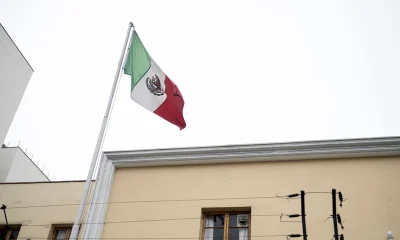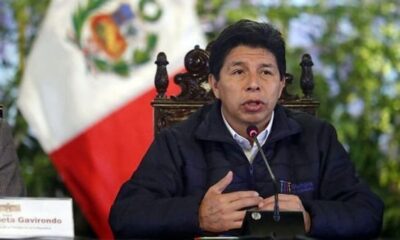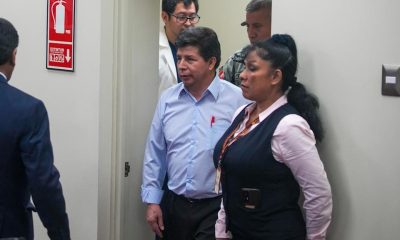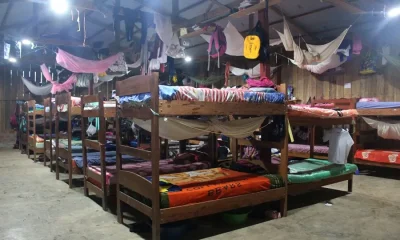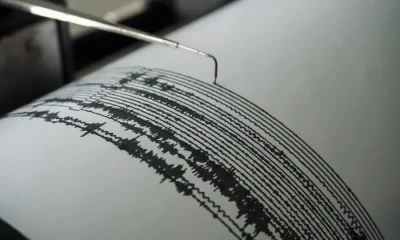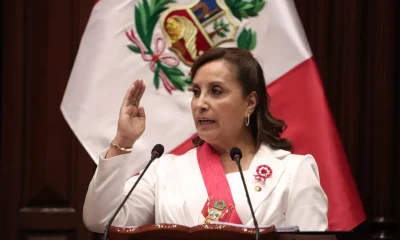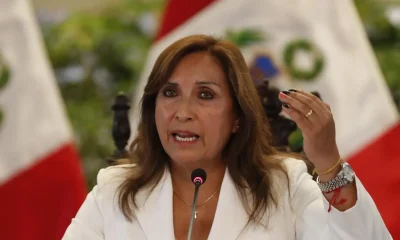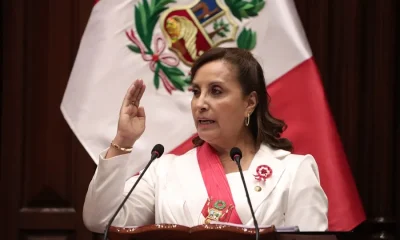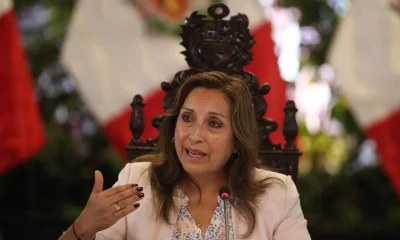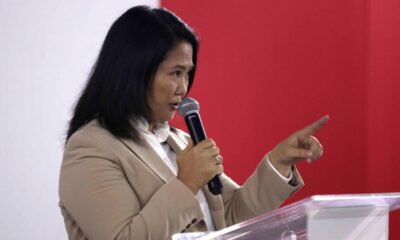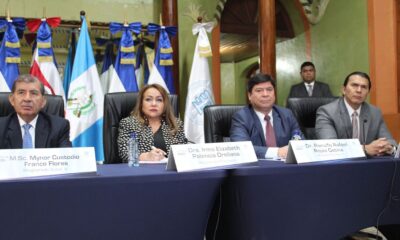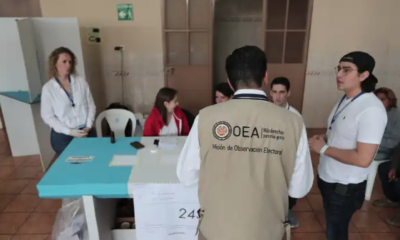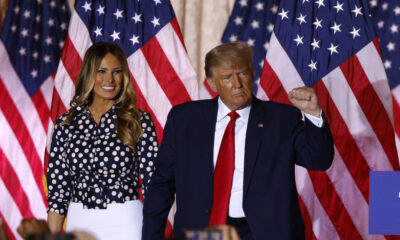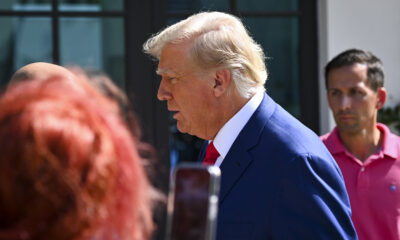International
Lima’s streets tense as Peru leader hints at early elections
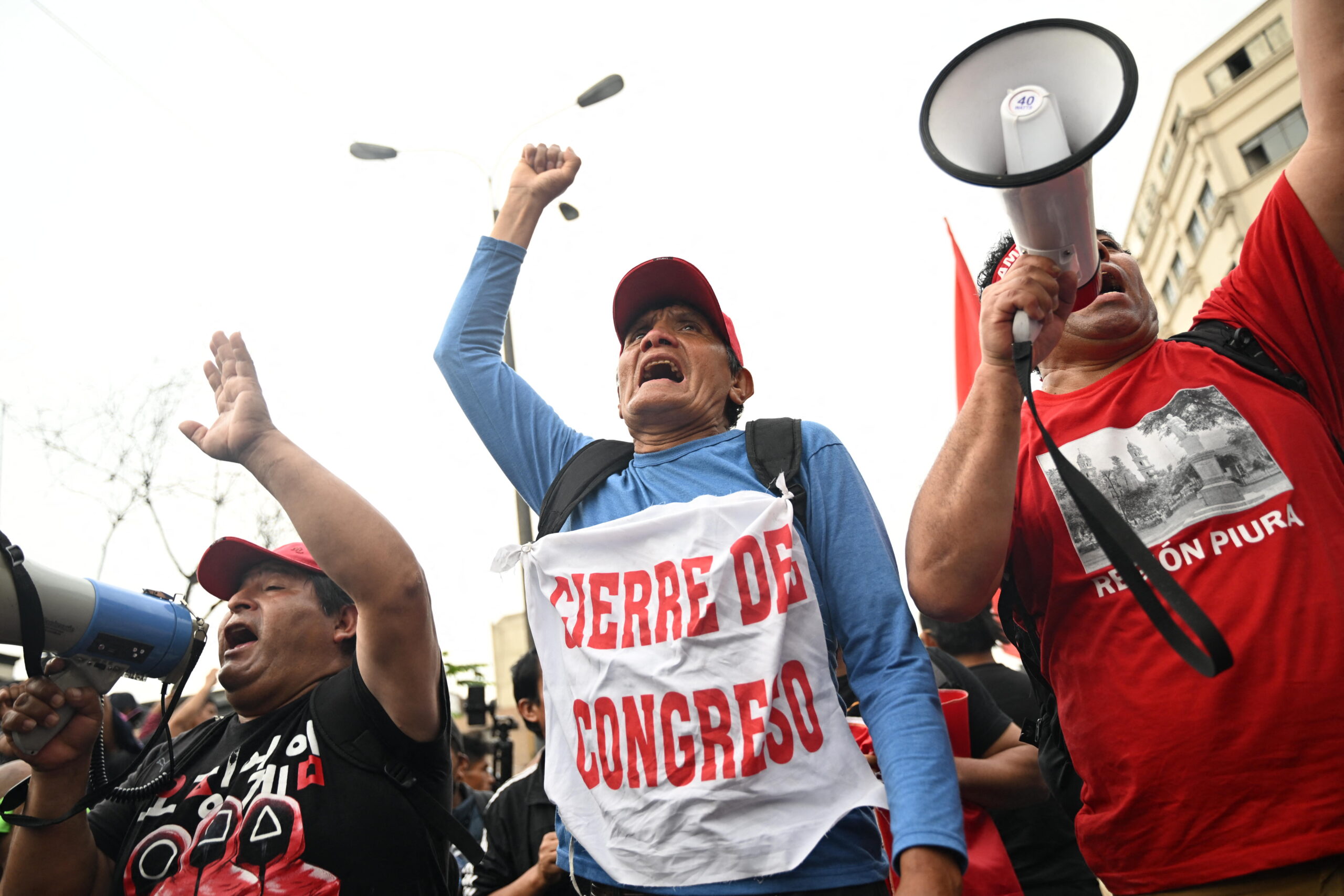
| By AFP | Luis Jaime Cisneros and Ernesto Tovar |
Peru’s new president Dina Boluarte has said she will form a new government Saturday, even as demonstrators pressed on Lima streets for ex-president Pedro Castillo to be freed after an alleged failed coup bid.
Boluarte told journalists that if the situation “warrants it,” the government will consult with Congress on holding an early presidential vote.
She urged those “who are coming out in protest … to calm down.”
Demonstrations continued on Friday, with protesters blocking roads with rocks, logs, and burning tires as they called for early elections.
The roadblocks interrupted traffic along the southern Pan-American Highway that links Peru and Chile.
Two days after the failure of his coup attempt, Castillo is sharing a detention center with former president Alberto Fujimori at a police base in Lima.
The prosecution accuses this left-wing rural teacher of rebellion and conspiracy, and a high court ordered him into seven days in preliminary detention.
On the streets, meanwhile, the demonstrations continue for the second day and fuel uncertainty about the possibility that Boluarte can conclude her term in 2026, as she herself announced upon taking office.
Hundreds of demonstrators marched through the colonial center of the capital, demanding Castillo’s release.
“I voted for Castillo, this Congress does not represent us, we want Castillo freed,” Maribel Quispe told AFP, in the march that left the central Plaza San Martin, and included the Prosecutor’s Office on its route to Congress.
“We want them to close this corrupt Congress and free Castillo. He made the decision to close Congress because they wouldn’t let him work,” marcher Sara Medina said.
Several dozen riot police officers closed the avenues that lead to the legislature to prevent the protest from passing through.
The demonstrators burned banners with the image of President Boluarte, shouting “coup leader!”
Earlier Friday, Castillo’s former chief of staff said that the Peruvian ex-president “could have been induced” by drugs to dissolve Congress and does not remember delivering the national address that led to his downfall.
Congress was supposed to debate Castillo’s impeachment on Wednesday on corruption charges, but the president preempted them by announcing in a televised speech that he was dissolving the assembly and would rule by decree.
“There are indications that the president was forced to read the message of dissolution, and whoever wrote the text did so in order to provide an argument for his removal,” ex-aide Guido Bellido said on Twitter.
Bellido, who visited his former boss at the Lima police base where he is held while under investigation for rebellion and conspiracy, also questioned Castillo’s mental condition.
“The psychological state of P. Castillo when reading the message to the nation shows that he was not in control of his faculties. This suggests that he could have been induced. A toxicological test is urgently needed,” he said.
The former rural school teacher won a shock electoral victory over Peru’s traditional elites in June 2021.
The charges against him carry a jail term of between 10 and 20 years.
Boluarte, who served as vice president under Castillo, was hastily sworn in as Peru’s first woman president just hours after the impeachment.
However, doubt is mounting over her ability to hold onto the job until the end of her mandate in 2026 in a country prone to political instability that is now on its sixth president in six years.
International
Security Council to Hold Emergency Meeting on Middle East Crisis

UN Secretary-General António Guterres on Saturday condemned the “military escalation in the Middle East” following attacks by the United States and Israel against Iran and Tehran’s retaliatory strikes, just hours before an urgent meeting of the UN Security Council.
“I call for the immediate cessation of hostilities and de-escalation,” Guterres said in a statement.
The Security Council is scheduled to meet on Saturday at 21:00 GMT (4:00 p.m. in New York) to address “the situation in the Middle East,” the United Nations announced.
The meeting, during which Guterres will deliver remarks, was convened at the request of France, Bahrain, Colombia, Russia and China, according to a diplomatic source.
International
Trump Floats “Friendly Takeover” of Cuba Amid Rising Tensions

U.S. President Donald Trump said Friday that his administration is considering what he described as a “friendly takeover” of Cuba, as Washington continues to increase pressure on the island’s communist government.
“The Cuban government is talking to us and they have very serious problems, as you know. They have no money, they have nothing at this moment, but they are talking to us and maybe we will see a friendly takeover of Cuba,” Trump told reporters as he departed the White House for a trip to Texas.
Earlier in the week, U.S. Secretary of State Marco Rubio said Cuba needed a “radical change,” shortly after Washington eased restrictions on oil exports to the island for what officials described as “humanitarian reasons,” amid a deep economic crisis.
The United States has imposed an energy blockade on Cuba since January, citing what it calls an “extraordinary threat” posed by the communist-run island, located roughly 150 kilometers (90 miles) off the coast of Florida, to U.S. national security.
International
Argentina’s Senate Reviews Milei-Backed Labor Overhaul

Argentina’s Senate on Friday began reviewing the Labor Modernization Law promoted by the administration of President Javier Milei, a proposal that would significantly reshape labor rules across the country.
The upper chamber opened its final discussion of the contentious initiative, which revises the method used to calculate severance payments — lowering the amounts owed in dismissal cases — and introduces an “hour bank” mechanism that allows overtime to be offset with paid leave rather than extra wages.
The legislation also broadens the classification of essential services, a change that would place new limits on the right to strike in designated sectors.
The bill was initially approved by the Senate on February 11 and then moved to the Chamber of Deputies, where lawmakers passed it with amendments. It has now returned to the Senate for definitive approval.
Outside the Congress building in Buenos Aires, workers, trade unions and left-wing organizations staged demonstrations beginning at midday. The gathering later thinned out amid reports of disturbances and a strong police presence. Security forces had secured the area surrounding the legislature since early morning hours.
Union leaders contend that the reform weakens labor protections, while many business representatives back the measure but stress that sustainable formal employment will require economic expansion, improved credit conditions, greater investment and a more dynamic domestic market.
-

 International4 days ago
International4 days agoFamily of “El Mencho” Seeks Return of Body After Deadly Military Operation
-

 International4 days ago
International4 days agoLarry Summers Steps Down from Harvard Role Amid Epstein Controversy
-

 International4 days ago
International4 days agoIran’s President Optimistic Ahead of Geneva Nuclear Talks with U.S.
-

 International3 days ago
International3 days agoBill Gates Admits “Serious Mistake” Over Epstein Ties
-

 International4 days ago
International4 days agoStephen Hawking Photo Appears in Newly Released Epstein Documents
-

 International2 days ago
International2 days agoCocaine Production Surges 34% in 2023 as Market Expands into Africa and Asia
-

 International2 days ago
International2 days agoFederal Judge Blocks Trump Policy Allowing Deportations to Third Countries
-

 International1 day ago
International1 day agoTrump Floats “Friendly Takeover” of Cuba Amid Rising Tensions
-

 International2 days ago
International2 days agoClinton Accuses Republican Committee of Using Epstein Case to Shield Trump
-

 International1 day ago
International1 day agoArgentina’s Senate Reviews Milei-Backed Labor Overhaul
-

 International11 hours ago
International11 hours agoSecurity Council to Hold Emergency Meeting on Middle East Crisis
-

 Sin categoría11 hours ago
Sin categoría11 hours agoTrump: ‘We Think It’s True’ Amid Claims Iran’s Supreme Leader Was Killed



























